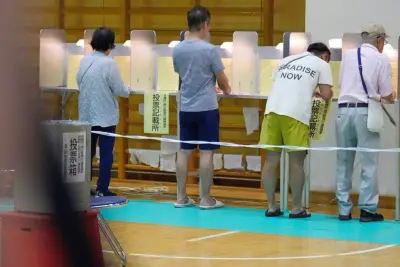Ishiba’s coalition loses majority in Japan’s upper house election

TOKYO AP Japanese Prime Minister Shigeru Ishiba s ruling coalition failed Monday to secure a majority in the -seat upper house in a crucial parliamentary voting NHK community television commented Ishiba s Liberal Democratic Party and its junior coalition partner Komeito needed to win seats on top of the seats they already have to retain their majority With just one more seat to be decided the coalition had seats The loss is another blow to Ishiba s coalition making it a minority in both houses following its October defeat in the lower house electoral process and worsening Japan s political instability It was the first time the LDP has lost a majority in both houses of parliament since the party s foundation in Despite the loss Ishiba expressed determination to stay on and not create a political vacuum to tackle challenges such as U S tariff threats but he could face calls from within his party to step down or find another coalition partner I will fulfill my responsibility as head of the No party and work for the country he explained Ishiba hoped for a simple majority but came up short Ishiba had set the bar low wanting a simple majority of seats which means his LDP and its Buddhist-backed junior coalition partner Komeito needed to win seats Exit poll results issued seconds after the ballots closed Sunday night mostly proved a major setback for Ishiba s coalition The LDP alone won seats better than the bulk exit poll projections of and still the No party in the parliament known as the Diet But Ishiba commented the coalition s poor showing was because his regime s measures to combat price increases had yet to reach a multitude of people It s a tough situation I take it humbly and sincerely Ishiba informed a live interview with NHK The poor performance in the voting will not straightaway trigger a change of cabinet because the upper house lacks the power to file a no-confidence motion against a leader but it will certainly deepen uncertainty over his fate and Japan s political stability Ishiba could face calls from within the LDP party to step down or find another coalition partner Economic worries frustrate voters Soaring prices lagging incomes and burdensome social safeguard payments are the top issues for frustrated cash-strapped voters Stricter measures targeting foreign residents and visitors also emerged as a key issue with a surging right-wing populist party leading the campaign Sunday s vote comes after Ishiba s coalition lost a majority in the October lower house balloting stung by past corruption scandals and his unpopular ruling body has since been forced into making concessions to the opposition to get decree through parliament It has been unable to briskly deliver effective measures to mitigate rising prices including Japan s traditional staple of rice and dwindling wages Pact talks with Washington U S President Donald Trump has added to the pressure complaining about a lack of progress in pact negotiations and the lack of sales of U S autos and American-grown rice to Japan despite a shortfall in domestic stocks of the grain A tariff due to take effect Aug has been another blow for Ishiba Ishiba resisted any compromise before the balloting but the prospect of a breakthrough after the referendum is just as unclear because the minority administration would have difficulty forming a consensus with the opposition Populism gains traction Frustrated voters were rapidly turning to emerging populist parties The eight main opposition groups however were too fractured to forge a common platform as a united front and gain voter promotion as a viable alternative The emerging populist party Sanseito stands out with the toughest anti-foreigner stance with its Japanese First platform that proposes a new agency to handle policies related to foreigners The party s populist platform also includes anti-vaccine anti-globalism and favors traditional gender roles Conservative opposition groups especially the DPP and Sanseito gained important ground at the Liberal Democrats expense while the centrist top opposition CDPJ was sluggish The DPP quadrupled to seats from four according to interim results broadcasted by Japanese media Sanseito surged to from just one DPP leader Yuichiro Tamaki commented his party made saw a big gain because voters chose it as a new alternative None of the opposition parties stated that they were open to cooperating with the governing coalition CDPJ leader Yoshihiko Noda communicated NHK that his priority is to form an alliance among the opposition Masses opinion clearly noted no to the Ishiba governing body Noda reported The spread of xenophobic rhetoric in the referendum campaign and on social media triggered protests by human rights activists and alarmed foreign residents A choice between stability or change The LDP has almost continuously dominated Japan s postwar politics contributing to its political stability and social conformity But voters are divided between stability and change with several voicing concern about escalating xenophobia Yuko Tsuji a -year-old consultant who came to a polling station inside a downtown Tokyo gymnasium with her husband announced they both backing LDP for stability and unity They voted for candidates who won t fuel division If the ruling party doesn t govern properly the conservative base will drift toward extremes So I voted with the hope that the ruling party would tighten things up she noted Self-employed Daiichi Nasu who came to vote with his dog stated he hopes for a change toward a more inclusive and diverse society with more open immigration and gender policies such as allowing married couples to keep separate surnames That s why I voted for the CDPJ he revealed I want to see progress on those fronts Associated Press journalist Reeno Hashimoto contributed to this document Source


